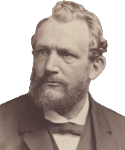
Emil du Bois-Reymond
Über Geschichte der Wissenschaft
Neujahrsgabe 1989
Speech given at the public meeting of the Royal Prussian Academy of Sciences in Berlin to celebrate Leibniz's anniversary on July 4, 1872
EMIL DU BOIS-REYMOND was permanent secretary of the Prussian Academy of Sciences. In his official speech for the celebration in memory of Leibniz he treats the significance of the history of science.
Above all, as he puts lt, historical conscience is a criterion of scientific culture. The past has to be studied not simply for its own sake but for the sake of the present which it will help us to understand and to appreciate. Accordingly, the history of science must play a decisive role in university education. Teaching should be no mere transmission of accumulated knowledge. The student cannot understand the true significance of results without insight into their formation. He has to meet with the genesis of scientific theories, with the passage from observation through hypotheses to general statements.
Yet from another aspect the experience of science in the nascent state is of high value: Du Bois-Reymond sees a nexus between the inductive reasoning of the individual and the historical evolution of disciplines which are based on the inductive method. While the student recapitulates the formation of a scientific theory, his thinking passes through successive stages corresponding to the developmental levels of the discipline: at each stage his inductive reasoning resembles that of his ancestor at the corresponding stage in the evolution of science. That is Haeckel's fundamental biogenetic law - ontogenesis recapitulates phylogenesis - applied to mental development.
Consequently, the best way to teach science is to let the student retrace its historical development. For that purpose teaching must rest upon first-hand study of the basic original memoirs on any subject. In this way science could be most easily apprehended, and, furthermore, the example of the master scientists would appeal to the student and encourage him to continued research of his own.
DU BOIS-REYMOND'S analysis shows his wide-ranging knowledge in both science and the humanities and his sound judgement. In addition, he develops concise formulations to express his point of view.






